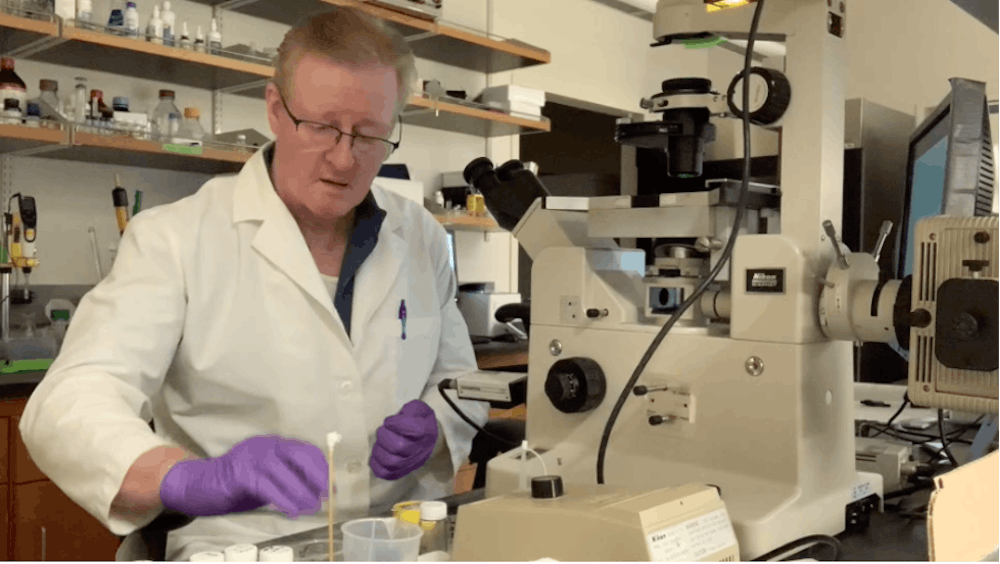Duke scientists are working to repurpose a pre-existing drug for use as a nasal spray that will add additional protection against COVID-19 “behind the mask.”
These researchers developed a prophylactic nasal spray and early treatment throat spray by repurposing niclosamide, a metabolic inhibitor previously used for 60 years for gut parasite infections.
David Needham, mechanical engineering and materials science professor, centered much of his research before the pandemic around new drug delivery treatments for cancer. He also had been working with Christina Barkauskas, assistant professor of medicine, to study a liquid suspension and nebulizer form of niclosamide as a therapeutic for lung fibrosis, he said.
Soon after commencing lung fibrosis research, in March 2020, a paper by researchers at the Pasteur Institute in Korea identified niclosamide as an especially notable drug candidate against severe acute respiratory syndrome coronavirus 2 (SARS-CoV-2), out of 48 FDA-approved drugs that were screened.
“Christina sent me the paper and, as I read it, I saw how effective niclosamide was in their study at completely stopping viral infection,” Needham said. “I realized that we knew we had lots of niclosamide and we knew how to deal with it. So, I pivoted away from cancer formulations to COVID formulations.”
Niclosamide works by blocking three of the six stages of viral infection. “It stops virus entry into the cell to prevent infection, shuts down viral replication to reduce viral load and secretes non-competent viruses to stop viral spread,” Needham said.
Formerly, niclosamide was FDA-approved in pill form. Needham and Barkauskas recognized that the most effective way to deliver niclosamide to fight COVID would be nasally and through the throat, since these are “sites where people are going to be exposed to respiratory viruses first,” Barkauskas said.
After working on a range of different formulations and submitting eight new invention disclosures to the Duke Office Of Translation and Commercialization, Needham was able to concert the normally insoluble drug into a simple solution by October 2020.
“Now we had a formulation that was optimized for mucin penetration—that is, it gets the drug through the mucus layers that naturally cover the epithelial cells in the nose and throat that the virus infects,” Needham said. Termed Niclosaspray by Needham, this was now the lead candidate for the nasal and throat spray.
In December 2021, Needham’s paper on the niclosamide formulation against COVID was published in the journal Pharmaceutical Research, followed by a press release by Ken Kingery, senior science communications specialist in the Pratt School of Engineering.
Several foundations denied the Duke researchers’ grant proposals, but eventually a proposal led by Barjauskas to the American Lung Association was approved. The research team now operates under this ALA grant for preclinical testing of niclosamide on cell cultures. They are aiming for approval for an Investigational New Drug (IND) to eventually test the medication on humans, Barkauskas said.
If clinical trials go well, the Niclosaspray product will be marketed as “added protection behind the mask,” Needham said. “Niclosamide is not the cure-all, [but] it has amazing properties because it works upstream of everything the cell does.”
A key question is whether variants of the virus will be able to resist the effects of COVID treatments such as antiviral pills Paxlovid and molnupiravir that aim to reduce disease severity.
A crucial distinction between niclosamide and these other drugs is that niclosamide is “virus-agnostic,” Barkauskas said. “Because it acts more specifically on the host and not on the virus, it should be effective against a number of respiratory viruses.”
“We hypothesize [niclosamide would work] against influenza and whatever other respiratory viruses come down the pike in a virulent fashion. It could also be helpful just with regular everyday common cold,” Barkauskas said.
Although Niclosaspray is relatively easy to produce and may be in high demand, Needham approaches his research with a bigger picture in mind: “Don't think that this is a venture capital investment thing,” Needham said. “I want it to be for the people. You know, people before profits. That's a politically loaded statement, but anyway, that's kind of what I believe.”
Their research team has experienced difficulty gaining traction with the clinical testing approval process, despite Duke’s wealth of connections and this project being “an opportunity for Duke to be seen to do some real good for the planet,” Needham said. However, they are hopeful to make it through the muddied water and receive an IND designation with human trials in the near future.
“We are determined to bring this through testing and, if it shows promise, offer Niclosaspray to the governments and people of the world, at cost or reduced reinvested profit as an open source pharmaceutical,” Needham said. “Wish us luck.”
Get The Chronicle straight to your inbox
Signup for our weekly newsletter. Cancel at any time.

